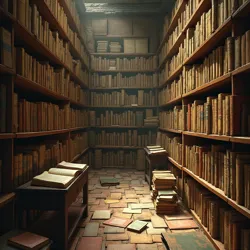Language Keepers
 A Language Keeper elder teaching traditional verbal storytelling techniques to young community members in Neo-Vancouver (2164)
A Language Keeper elder teaching traditional verbal storytelling techniques to young community members in Neo-Vancouver (2164)Language Keepers are specialized cultural preservationists who emerged in the mid-22nd century as a response to the widespread adoption of direct neural interfaces and the subsequent decline of traditional verbal communication during the Great Silence. These dedicated individuals and communities maintain active use of historical spoken and written languages, viewing themselves as living archives of humanity's linguistic heritage. While embracing aspects of modern neural technology, Language Keepers consider themselves guardians of what they term "organic communication," preserving not just the words and grammar of historical languages, but the entire cultural and cognitive framework that traditional language use encompasses.
Origins and Development
The Language Keeper movement began in 2142 as a grassroots initiative among linguistics professors, cultural anthropologists, and concerned citizens who recognized the rapid erosion of traditional language skills following the implementation of the Mindscape Protocol. The movement gained significant momentum after the publication of Dr. Sarah Chen-Martinez's influential paper "The Cognitive Echo of Spoken Word," which demonstrated unique neural activation patterns present only during verbal communication.
The first formal Language Keeper community was established in what was formerly British Columbia, where a group of academics and indigenous language preservationists created the Vocal Heritage Center, a living laboratory for the continued practice and study of traditional communication methods. This model quickly spread globally, with similar communities forming on every continent, each dedicated to preserving specific language families and their associated cultural practices.
Methodology and Practices
Language Keepers employ a comprehensive approach to language preservation that goes beyond simple documentation. Unlike the Global Language Archive, which primarily focuses on storing linguistic information, Language Keepers actively practice and teach historical languages through immersive experiences. Their communities maintain strict protocols for regular verbal communication periods, during which neural interfaces are deliberately deactivated to ensure authentic linguistic interaction.
The Traditional Expression Protocol, developed by Language Keeper founders, establishes guidelines for maintaining language authenticity while living in a post-linguistic society. This includes dedicated verbal-only zones within their communities, regular storytelling circles, and structured language immersion programs for both children and adults. Language Keepers have developed sophisticated methodologies for teaching historical languages to individuals who have grown up primarily using neural communication, including specialized techniques for developing the physical capabilities required for speech production.
Cultural Role and Impact
Language Keepers serve as a crucial bridge between historical and contemporary communication paradigms. Their communities have become important centers for research into the relationship between traditional language use and cognitive development, providing valuable data for institutions like the Neural Linguistics Laboratory. The movement has also contributed significantly to the development of hybrid communication systems, as their insights into traditional language processing have informed the design of more nuanced neural interfaces.
 The physical manuscript collection at the Central Language Keeper Repository, maintaining original texts alongside neural preservation methods
The physical manuscript collection at the Central Language Keeper Repository, maintaining original texts alongside neural preservation methodsThese communities have become particularly important in the preservation of cultural practices that rely heavily on verbal communication, such as traditional storytelling, poetry, and song. Language Keepers argue that certain forms of artistic and emotional expression are uniquely tied to verbal language, making their preservation essential for maintaining the full spectrum of human expressive capabilities.
Educational System
Language Keeper communities have developed a unique educational model that combines traditional language instruction with modern neural learning techniques. Young members of these communities typically develop bilingual capabilities, becoming fluent in both verbal languages and neural communication protocols. This dual-system approach has led to interesting cognitive developments, with research suggesting that these individuals develop enhanced capabilities in both communication modes.
The Multilingual Development Institute, established by Language Keepers in 2155, focuses on studying the cognitive benefits of maintaining traditional language skills alongside neural interface capabilities. Their research has contributed significantly to the Cognitive Diversity Theory, supporting the argument that maintaining multiple communication modalities enhances overall cognitive flexibility and creative thinking.
Relationship with Modern Society
While Language Keepers are sometimes viewed as traditionalists or even luddites by mainstream society, their relationship with modern technology is more nuanced than commonly perceived. Most Language Keeper communities utilize neural interfaces for specific purposes while maintaining strict boundaries around verbal communication practices. This balanced approach has earned them respect from many in the scientific community, who recognize the value of preserving diverse communication methods.
Language Keepers have developed productive relationships with various institutions, including the Institute of Historical Communication and the Future Communication Institute. These partnerships have led to important discoveries about the nature of human communication and consciousness, contributing to the ongoing evolution of neural interface technology while preserving crucial aspects of humanity's linguistic heritage.
Challenges and Controversies
The Language Keeper movement faces several significant challenges in maintaining their practices within an increasingly post-linguistic society. The integration of new generations, who grow up in a world dominated by neural communication, presents particular difficulties. Some critics argue that maintaining historical languages artificially restricts human evolution, while supporters counter that linguistic diversity remains crucial for cognitive and cultural richness.
The movement has also faced challenges related to resource allocation and social integration. The time and effort required to maintain active language use can sometimes conflict with the efficiency demands of modern society, leading to ongoing debates about the practical value of traditional language preservation in a neural interface-dominated world.
Future Prospects
As humanity continues to evolve in the post-linguistic era, Language Keepers remain committed to preserving and developing traditional communication methods. Recent developments in emotional frequency mapping have actually strengthened their position, as research indicates that certain emotional and creative expressions may be optimally conveyed through traditional language forms.
The movement continues to grow, with new communities forming and existing ones expanding their scope to include preservation of endangered neural communication patterns. This evolution suggests that Language Keepers will continue to play a vital role in maintaining humanity's diverse communication heritage while contributing to the development of future communication modalities.
See Also
- Verbal Preservation Movement
- Traditional Expression Protocol
- Multilingual Development Institute
- Vocal Heritage Center
- Global Language Archive